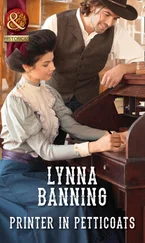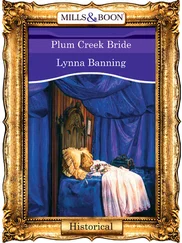She dragged the woven rag rug that covered the loft floor outside, tossed it over the clothesline and beat it with the broom until the puffs of dust made her cough.
What next? She felt compelled to keep herself busy; if she allowed herself to stand still for a moment she would think about her marriage and the bed and the coming night and Thad MacAllister, who was now her husband.
What would it be like, lying close to him in the dark, feeling his hands on her skin? Such thoughts made her shiver.
She reswept the kitchen floor, rinsed out a camisole and a pair of white silk drawers in the sink and hung them on the clothesline next to the rug from Teddy’s loft. Now she must think about supper for the three of them.
The tiny pantry off the kitchen held a barrel of flour, sacks of sugar, rice, dried beans and potatoes, and a hanging slab of moldy-looking bacon. No carrots or peas or turnips or herbs. No fresh fruit, either—only a lone tin of peaches and a bushel basket half full of apples. What could she make out of such a conglomeration?
Hours later, footsteps boomed across the front porch and Thad walked in with Teddy at his heels. At the stove, Leah froze with her back to them.
“Somethin’ sure smells funny, Pa.”
“Looks different, too, son. Kinda…shiny.”
Teddy clambered up the ladder to the loft and an instant later let out a squawk like an enraged rooster. “My bed’s all diff’rent! And my rocks—somebody’s been messing with my rocks!”
His head appeared over the railing. “She did it! I hate her!”
Thad ignored his son and gazed around the cabin. Clean windows. Scrubbed floor. No dishes in the sink. Looked as if a cyclone had blown through the place. He began to frown before Teddy finished yelling. He liked what Leah had done. But for some reason deep inside he didn’t want to like it. It seemed disloyal to Hattie.
But Hattie is gone . And Leah was here. He could hardly believe Leah was his wife now, and he had to admit his reaction to the state of his house had nothing to do with Hattie. He couldn’t bear to think about it too closely.
The cyclone was standing at the stove. Apparently she was a fastidious housekeeper, and of course his son wouldn’t appreciate that. Thad wondered why he didn’t appreciate it.
The spit and polish this half-Chinese girl had shown in just a few hours reminded him not so much of Hattie as his Scots mother. She was long dead now, as was his father. That was one reason Thad had come to America—the Scots were starving. He had just passed his twelfth birthday and both his parents were gone.
Hattie, he recalled, had not been a particularly careful housekeeper, but she had been his lifelong companion. And because he had loved her, he had forgiven her any domestic shortcomings.
But seeing another woman in her place sent a blade through his gut. It wasn’t that he regretted marrying Leah—just that he regretted losing Hattie.
Teddy clattered down the ladder and slouched toward the kitchen table. “I spose you want me to set out the plates,” he grumbled.
Leah turned to look at him. “Yes, thank you, Teddy. That would be nice.”
“Don’t have enough chairs, Pa. Guess she’ll have to sit on that old nail keg, huh?”
Thad met Leah’s questioning eyes and to his relief saw that she was amused, not angry. She clapped her hand over her mouth to keep from laughing. Teddy’s suggestion of the nail keg even brought a chuckle to his own throat.
“Well, son, you have two choices. Either you cobble up an extra chair or you eat your dinner standing up. Leah and I are sitting at the table.”
“Aw, Pa.”
“Don’t ‘Aw, Pa’ me, Teddy. Take it or leave it. I’d tan your hide good if it wasn’t our wedding day.”
Teddy said nothing, but Thad noted that he dutifully laid three plates on the table and then disappeared.
“Hunting up a chair, I’d guess,” he murmured at Leah’s back. She’d found one of Hattie’s aprons and tied it twice around her waist in an oversize, floppy bow. His heart gave an odd lurch at the sight. Dammit, he remembered that apron. Oh, God, he wished it was Hattie there at the stove.
But it wasn’t Hattie, it was Leah. His new wife. Dammit, he could hardly bring himself to say the word. He focused on her slim figure and felt a flicker of warmth. He hadn’t necessarily expected to like his mail-order bride and now the woman was his wife.
He didn’t have to like her, he told himself; all he had to do was get along with her.
The front door banged open and in stomped Teddy, dragging a dust-coated, straightbacked wooden chair. “Found it in the barn,” he muttered.
Thad squeezed his thin shoulder. “Well done, Teddy.”
“I hope it breaks when she sits on it!”
Thad bent and tipped his son’s chin up with his forefinger. “No, you don’t, Teddy. Things are plenty difficult for all of us right now, so you’ll hold your tongue. From now on, if you want to say anything about my wife, you say it directly to Leah, understand?”
“Okay.” Teddy sucked in a breath and sent a venomous look at her back. “I don’t like you, Leah.”
Thad grabbed the boy by his shirt collar, then heard Leah’s calm voice offer a retort he could not have predicted with a crystal ball.
“I do not like you either, Teddy.”
The boy’s mouth dropped open. “Huh? How come?”
“Because,” Leah said, turning to face him, “the things you say hurt my feelings.”
Thad blinked, then caught Leah’s steady gaze. He raised his eyebrows and gave his new wife as much of a smile as he could muster.
In an agony of unease, Leah watched Thad and Teddy seat themselves at the wooden kitchen table. She poured Teddy a glass of fresh milk from the pail Thad had brought in, then filled Thad’s china cup with coffee that suddenly looked too black and too thick. Thad reached his spoon to the milk glass, dipped some out and dribbled it into the cup. Now it looked like water from a mud puddle.
Teddy poked his fork at his father’s cup. “That sure looks awful.”
Leah’s face grew hot. “I have never made coffee before,” she confessed. “In China we drink tea.”
Hiding her face, she gathered up the three plates and whisked them over to the stove, where the skillet rested with her steaming dinner dish. There was no wok, so she had used the iron frying pan to cook in. She scooped a large dollop of the mixture onto each plate.
She placed Teddy’s dinner before him. The boy wrinkled his nose. “What’s that stuff?”
“That is called chow fun . It means ‘vegetables with noodles.’ In China, we make it with chicken.”
“Eww,” Teddy muttered.
Leah tried to see the dish through the eyes of a young American boy: a pile of thinly shaved potatoes covered with fried onions and topped with crumbled bacon. Of course, some ingredients were missing—not just chicken, but the noodles, crisp green peapods and a dribble of plum sauce. In China, the dish was special; here in Oregon it was obviously not.
Teddy dropped his fork and laid his forehead on the table next to his plate. “I can’t eat it, Pa.”
“Nobody’s pushing you, son.” Thad jammed his own fork into the mound on his plate and purposefully shoved a bite into his mouth. The apprehensive look on his face faded to surprise.
“Not bad,” he said. “Pretty good, in fact.” He gobbled another bite, then another. Leah ate quietly beside him, noting that he took only one tiny sip of the coffee she had made. Her throat tightened.
For dessert she had baked a traditional Chinese tart made of layered apple slices, but now she hesitated to present it. She would never understand American cooking. She feared she would never fit into American life no matter what she learned to cook. Finally she gathered up her courage, set the tart in front of Thad and handed him a knife to slice it into wedges.
Читать дальше












